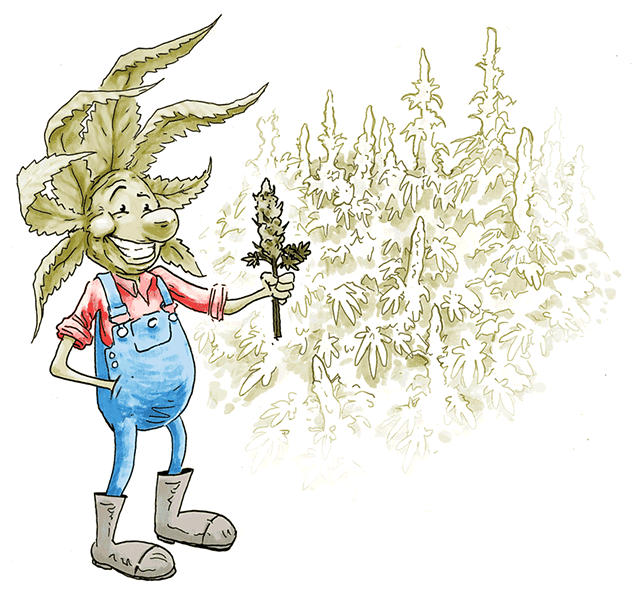
- File: Luke Eastman
Ramsay Mellish knew he would need to adapt if he wanted to survive in Vermont's hard-pressed dairy industry. So, like many others in recent years, the first-generation farmer set out to diversify his crops and started growing hemp.
Mellish and his wife, Caroline, did fine growing the plant last summer, he said, netting a few thousand dollars from selling much, but not all, of the harvest from their eight-acre field. They believed that growing hemp would prepare them to jump at a bigger opportunity: marijuana.
"Ultimately, [that is] the future in the Vermont cannabis world," Mellish told Seven Days over the phone last week as cows mooed loudly in the background. "We'd like to be there at some point."
Indeed, Mellish is among Vermont farmers and hemp growers who consider pot the next logical step in their farming evolution. But now, just as advocates are increasingly hopeful that the Vermont legislature will legalize the retail sale of marijuana this year, farmers fear that a recent change in the legislation could shut them out of the market.
Last week, a House committee added language to the pot bill, S.54, declaring that marijuana cultivation would not be considered farming in the eyes of the law. The provision would clear the way for towns to regulate — and limit — marijuana farming by treating grow operations like any other business.
Vermont law generally extends notable deference to farmers. Most agricultural practices, including hemp farming, are exempt from local zoning regulations. Further, farmers can take advantage of generous tax exemptions. They can avoid paying sales tax on many items, including farm equipment. They can also get property tax breaks.
In changing the legislation, members of the House Government Operations Committee said they want to protect Vermonters from big corporations that might swoop in and take advantage of those permissive farming laws. Such an influx would both deprive the state of significant tax revenues and prevent localities from deciding where these operations can be located, said committee chair Sarah Copeland Hanzas (D-Bradford).
"We don't want the R.J. Reynolds of cannabis coming into Vermont and all of a sudden being given all of the exemptions that our dairy farmers get, and having Vermonters be up in arms saying, 'You've got to be kidding me! We're going from prohibition to, they can grow this right next to my elementary school, and there's nothing I can do about it?'" Copeland Hanzas said.
Similar concerns led Rep. Jim Harrison (R-Chittenden) to vote against the bill in committee last year.
"It's not like living next to a hayfield, where some manure might be put out in the field and in a couple days it's gone," Harrison told Seven Days. "Cannabis is going to have a smell — if it's anything like hemp, which I suspect it is — for a couple months."
Harrison is also worried about security, recalling thefts of hemp plants that were mistaken for marijuana. Though the bill requires that grow operations be in an "enclosed, locked facility" and away from public view, Harrison still envisioned them popping up in cul-de-sacs, surrounded by barbed-wire fences. For neighbors, it's an issue of fairness, he said.
After his committee removed the farming exemption, the Republican lawmaker changed his vote, believing that towns now would have a necessary layer of local control. Others, however, fear the move could cut out the very farmers that the legislature says it wants to help succeed.
"The question that is missing — and no one is answering — is, what does this mean for farmers?" said Caroline Gordon, a lobbyist with Rural Vermont who advocates for farmers.
Requiring a permanent, locked perimeter makes it nearly impossible for farmers to rotate crops, she said. And without farming protections, commercial growers would need to adhere to zoning regulations just like the state's existing medical marijuana growing operations. Those local rules vary, giving prospective growers little clarity on where they might be able to set up shop.
The lack of clear, uniform local regs was apparent during an explanation of the changes at a House Democratic caucus last week. When asked whether a hemp grower who lives on land zoned for agriculture would be able to grow marijuana, Gov Ops vice chair John Gannon (D-Wilmington) replied, "It depends."
"It's on a town-by-town basis," he said.
For hemp farmer Jahala Dudley, that's a concern. Dudley said she has been planning to buy land and grow weed for the commercial market. After looking for land zoned agricultural, she said she now wonders if her best bet would be to look in towns with no zoning laws at all.
"That limits me tremendously," she said.
Lawmakers have tried to prevent communities from making unilateral decisions about cannabis. For example, one provision of the bill says municipalities could not rewrite zoning regulations to create an outright ban on marijuana retail or growing establishments.
Still, a creative enough town could significantly limit where grow operations could be located. It's not hard to imagine that scenario. Some communities have already preemptively prohibited retail marijuana sales, even though most lawmakers say the legislation would trump those bans.
Copeland Hanzas conceded that lawmakers can't envision all of the "weird intricacies" that might exist.
"If you have a dairy farm and the rest of your neighborhood is zoned industrial or commercial, is a municipality actually going to preclude you from getting a cannabis license?" she asked. Or would a town rather allow those who already farm on their land to simply add marijuana to the mix?
"We just don't know," she continued.
Such unknowns could discourage newcomers from growing cannabis, said Gordon, the Rural Vermont lobbyist.
"If they open that door to local zoning, then a farmer cannot foresee what happens," Gordon said. "That, of course, is an obstacle."
Nearby states with retail weed markets have taken an approach similar to the one proposed by Gov Ops. Neither Maine nor Massachusetts extends ag zoning exemptions to cultivators. But critics of S.54 say lawmakers should instead focus on creating a market the Vermont way.
"Cannabis is a plant and should be permitted to be grown by families on their farms, as a means to support their lives, not mandated to be cultivated solely within large, environmentally detrimental commercial warehouses," argues the Vermont Growers Association on its website, referring to how indoor grow operations, which rely on electrical light instead of sunlight, consume hefty amounts of energy.
The trade group, which represents "cannabis professionals," has started a campaign urging major changes to the bill and has created a boilerplate letter that supporters can send to lawmakers. The letter argues that the classification of cannabis as a nonagricultural product would impede or prevent local farmers from obtaining cultivator licenses, ceding the market to larger-scale indoor growers.
Scott Waterman, a spokesperson for the Agency of Agriculture, Food and Markets, echoed that sentiment. In an email to Seven Days, Waterman wrote that the committee's decision contradicts the legislature's declared intent of encouraging small-scale farming operations.
Copeland Hanzas was not blind to the unintended consequences. Lawmakers are trying "to meet the concerns of prohibitionists who still don't believe it should be a legal product," she said, "but also weave into that the concerns of people who would like to be able to get into this agricultural commodity as a way of saving their working landscape."
The House Natural Resources, Fish and Wildlife Committee offered an amendment last month that would exempt outdoor growing operations — but not indoor ones — from local zoning.
But lawmakers who want outdoor operations to pay full sales and property taxes like any other business decided the simplest legislative approach would be to determine that growing was not an agricultural practice.
The bill recently passed through the House Ways and Means Committee, which added a combined 20 percent tax rate on retail cannabis sales. The measure is now before the spending-focused Appropriations Committee, its likely last stop before a vote of the full House.
Related House Committee Proposes a 20 Percent Tax on Pot and Advances Bill

If it passes, it would then head to a conference committee, where House and Senate lawmakers would resolve differences in their versions of the bill. There, contentious provisions can often end up on the cutting-room floor.
Tim Fair, a Burlington attorney who focuses on cannabis laws, said he expects House lawmakers will use the farming provision as a bargaining chip to win the Senate's approval on other changes.
"We may be arguing about something that's not even included," Fair said.
For Gordon, the Rural Vermont lobbyist, the bill's progress has been something of a roller coaster. Her group has been hesitant to oppose the legislation despite a number of concerns.
"It's a huge fight for so many advocates to just get legalization done, and we want to support that, because we do see it as a huge opportunity," she said.
But last week, after the farming exemption was removed, Rural Vermont decided to oppose the current bill.
"Our farmers ... are all struggling with viability," Gordon said. "For them, this should be the business opportunity in the future of farming in Vermont, but they are not considered."














Comments (5)
Showing 1-5 of 5
Comments are closed.
From 2014-2020, Seven Days allowed readers to comment on all stories posted on our website. While we've appreciated the suggestions and insights, right now Seven Days is prioritizing our core mission — producing high-quality, responsible local journalism — over moderating online debates between readers.
To criticize, correct or praise our reporting, please send us a letter to the editor or send us a tip. We’ll check it out and report the results.
Online comments may return when we have better tech tools for managing them. Thanks for reading.